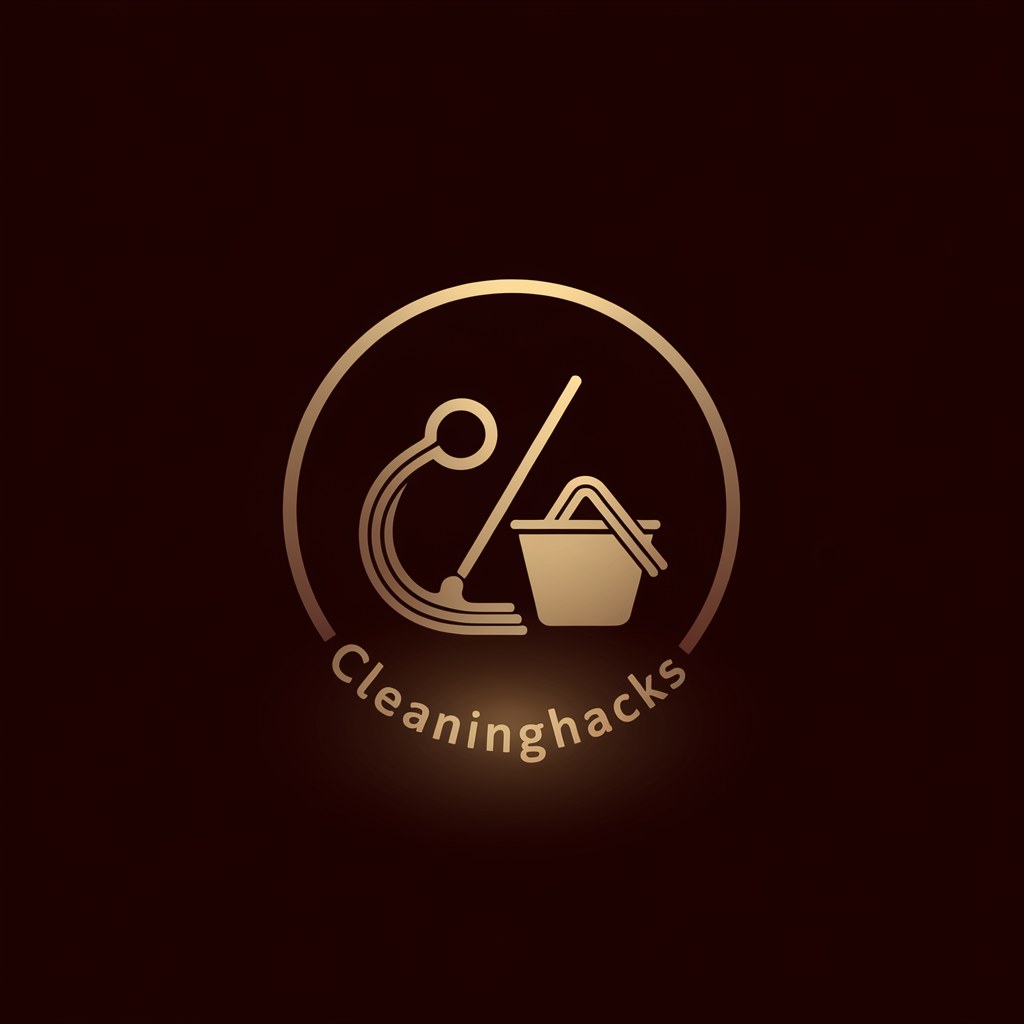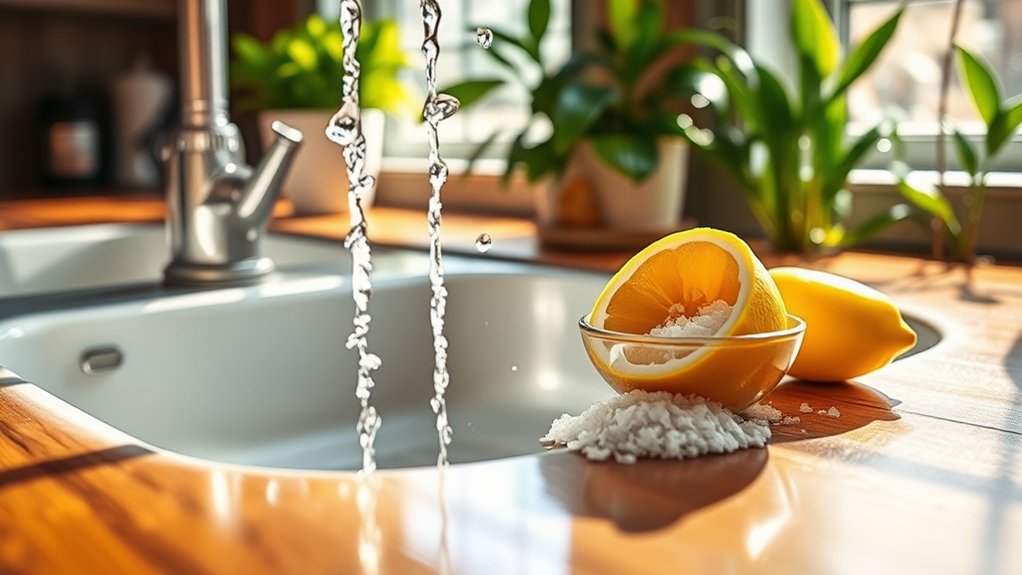Unclog Your Drain With This Kitchen Ingredient
Isn’t it frustrating when your drain gets clogged at the most inconvenient times? Fortunately, you don’t need harsh chemicals to tackle the problem. A simple mixture of baking soda and vinegar can work wonders to clear blockages and eliminate odors. If you’re curious about how this common kitchen ingredient can save your plumbing and prevent future issues, stick around to learn more about the process and additional helpful tips.
The Problem With Clogged Drains
Clogged drains are more than just a nuisance; they can lead to serious plumbing issues if left unresolved. You might notice slow drainage, unpleasant odors, or even gurgling sounds from your pipes.
These signs indicate buildup that needs attention. Don’t worry—there’s a simple drain baking soda tip you can try!
Pour half a cup of baking soda down the drain, followed by half a cup of vinegar. Allow it to sit for at least 30 minutes, then flush with hot water. This quick method can help break down clogs and keep your plumbing in good shape without harsh chemicals. Baking soda has been proven to effectively unclog your drain when combined with vinegar.
Why Baking Soda Works
You might wonder why baking soda is so effective for unclogging drains. Its alkaline properties create a chemical reaction when combined with vinegar, producing carbon dioxide gas that helps break down stubborn clogs.
This bubbling action not only lifts debris but also neutralizes odors, making your drain smell fresh again. Additionally, baking soda is non-toxic, ensuring it’s safe for both your plumbing and the environment. In fact, using homemade drain cleaner can be more effective and economical than store-bought alternatives.
When used regularly, it can help prevent future blockages by keeping your pipes clear. So keep a box handy in your kitchen, and tackle those clogs with this simple yet powerful ingredient!
Materials You’ll Need
To effectively tackle a drain clog, gathering the right materials is essential.
You’ll need a few common items you likely already have at home. Having these on hand will make your unclogging experience smoother and more efficient.
- Baking soda
- White vinegar
- Hot water
- A measuring cup
With these materials, you’ll be ready to address that pesky clog. Baking soda and vinegar create a powerful reaction, which is one of the effective DIY drain cleaning techniques mentioned in this guide, while hot water helps flush everything away.
It’s a simple and eco-friendly approach that can save you from costly plumbing bills. Get these items together, and you’re set to go!
Step-by-Step Instructions
When tackling a drain clog, following a clear set of steps can make the process easier and more effective.
Start by pouring half a cup of baking soda down the drain. Follow that with a cup of vinegar, and let it fizz for about 15 minutes.
After that, flush the drain with hot water for several minutes to help clear any remaining debris.
If the clog persists, repeat the process or try using a plunger.
Finally, make sure to clean any visible debris from the drain cover.
These steps should help restore your drain’s flow without harsh chemicals.
Tips for Prevention
To keep your drains clear, you’ve got to adopt some simple prevention habits. Regular cleaning, disposing of food scraps properly, and using drain covers can make a big difference. Additionally, using a natural drain cleaner made from simple kitchen ingredients can help maintain clear pipes and reduce buildup. Let’s explore how these easy steps can help you avoid clogs in the first place.
Regular Cleaning Habits
Regular cleaning habits are essential for preventing drain clogs and keeping your plumbing in good shape.
By staying proactive, you can save time and money on future repairs. Here are some practical tips to incorporate into your routine:
- Regularly flush your drains with boiling water to clear out grease.
- Use a drain strainer to catch hair and food particles.
- Clean your sink and disposal area weekly to remove buildup.
- Schedule monthly vinegar and baking soda treatments for maintenance.
These simple steps make a big difference; they’ll help you avoid clogs and keep your drains running smoothly all year round.
Food Scraps Disposal
Managing food scraps is a key part of preventing clogs in your drain. Always dispose of scraps properly to keep your pipes clear. Instead of rinsing food debris down the sink, toss it in the compost or trash.
Scrape plates into the bin before washing, and consider having a dedicated container for scraps. Avoid putting fibrous foods like celery or starchy items like potato peels down the disposal, as they can create blockages.
If you do use the disposal, run plenty of water to help flush the scraps away. A little attention now can save you headaches later!
Use Drain Covers
While you mightn’t think about them often, drain covers are a simple yet effective way to prevent clogs in your plumbing system.
By using drain covers, you can save yourself from messy backups and costly repairs. Here are some benefits of using them:
- Keeps hair and debris out: Prevents buildup from everyday use.
- Easy to clean: Most covers can be rinsed off quickly.
- Increases lifespan of your plumbing: Less clogs mean less wear and tear.
- Variety of designs: Choose what complements your kitchen or bathroom style.
Investing in drain covers is a proactive step towards maintaining smooth-flowing drains!
When to Call a Professional
If you find yourself dealing with persistent clogs despite your best efforts, it might be time to call in a professional. Severe plumbing issues, like leaking pipes or gurgling drains, are also signs that you shouldn’t tackle the problem alone. Getting expert help early can save you time and money in the long run. Additionally, effective unclogging solutions can prevent the situation from worsening and causing further damage.
Persistent Clogs Require Assistance
When your DIY efforts to unclog a drain seem to only make matters worse, it might be time to call in a professional.
Ignoring persistent clogs can lead to bigger problems, so consider professional help if you notice:
- Repeated clogs within a short time frame
- Foul odors coming from the drain
- Water draining slower than usual
- Gurgling noises in your pipes
These signs may indicate deeper issues in your plumbing.
Don’t wait too long; a professional can diagnose the problem accurately and ensure your plumbing system functions smoothly again.
Taking swift action can save you time and money later.
Severe Plumbing Issues Alert
Ignoring severe plumbing issues can quickly escalate into a costly nightmare. If you notice multiple clogged drains, foul odors, or water pooling, don’t hesitate to call a professional. These signs often indicate deeper problems that simple solutions can’t fix.
| Signs to Call a Pro | Suggested Action |
|---|---|
| Gurgling sounds from drains | Immediate inspection needed |
| Persistent leaks | Avoid further water damage |
| Low water pressure | Check for pipe blockages |
Addressing these issues promptly can save you from extensive repairs down the road. Trust your instincts—it’s worth the call!

